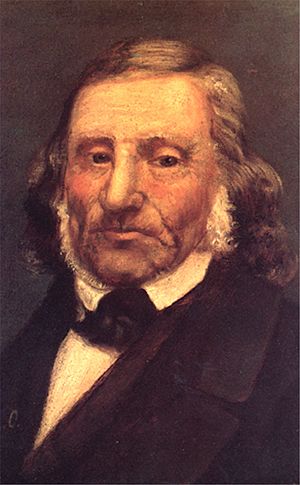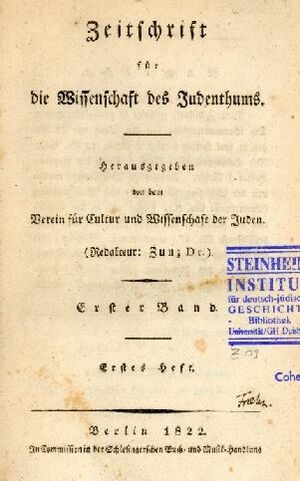Wissenschaft des Judentums facts for kids
Wissenschaft des Judentums (pronounced VISS-en-shaft des YOO-den-tooms) is a German phrase meaning "Science of Judaism." It's also known as "Jewish Studies" today. This was a movement in the 1800s that aimed to study Jewish history, literature, and culture using modern research methods. People wanted to understand where Jewish traditions came from.
Contents
Early Efforts: The Verein
The first group to try and spread Wissenschaft des Judentums was called the Verein für Kultur und Wissenschaft der Juden. This means "Society for Jewish Culture and Jewish Studies." It was started around 1819 by Eduard Gans and his friends. Other famous members included Heinrich Heine and Leopold Zunz.
This group wanted to show that Jewish people were a unique "Volk" (people). They believed Jewish culture was important on its own, not just because of religion. They wanted to prove that Jewish cultural traditions were as valuable as German ones. Immanuel Wolf wrote an important essay in 1822 about these ideas. The main goal was to study Judaism using modern research and critical thinking.
However, the Verein didn't last long. Many German Jews preferred to connect with German culture. Sadly, some of its leaders, like Gans and Heine, even converted to Christianity.
The Wissenschaft Movement Begins
Even though the first group failed, its ideas inspired many Jewish thinkers. They started a bigger Wissenschaft des Judentums movement. This movement also faced some opposition.
The historian Amos Elon wrote that the movement began during anti-Jewish riots in Germany in 1819. He said its goal was to help Jews join German culture. At the same time, it aimed to strengthen their Jewish identity. It did this by connecting secular (non-religious) and religious Jewish learning. The movement explored Judaism as both a culture and a religion. It wanted to help young Jews stay Jewish, even as society became more secular.
Dr. Henry Abramson explains that the main goal was to find a way for Jews to be proud of their identity. They wanted to show they were loyal citizens of their countries. The movement looked a bit different in various countries. For example, in England, the relationship between Jews and Christians was less tense. So, scholars there focused more on Jewish law and prayer. They also allowed women and non-traditional scholars to join.
Main Goals of Wissenschaft
People who supported Wissenschaft des Judentums wanted Jewish culture to be seen as equal to Western European culture. They worked hard to get "Jewish Studies" recognized as a proper subject at universities. Before this, Judaism was often seen as less important than Christianity.
These scholars also created a new way of studying old Jewish texts. They believed in complete freedom to interpret these texts. They didn't worry about how their interpretations might affect religious practices.
Leopold Zunz (1794–1886) was a very important leader of this movement. He spent a lot of time studying old Jewish writings from rabbis. At that time, Christian thinkers often believed that Jewish contributions ended with the Bible. Zunz started publishing works about Jewish writings that came after the Bible. His essays and a biography of Rashi were very important.
When the government in Prussia stopped sermons in German synagogues, Zunz wrote a book called History of the Jewish Sermon in 1832. This book showed that sermons were part of Jewish tradition too. It is considered one of the most important Jewish books of the 1800s.
How Wissenschaft Saw Religion
Many Wissenschaft scholars, like Zunz and Heinrich Graetz, did amazing research. However, the movement sometimes presented Judaism as something from the past. It often didn't focus on issues important to Jews at that time.
Some scholars, like Moritz Steinschneider, even joked that Wissenschaft des Judentums was like giving Judaism a proper burial. They saw their work as writing a detailed history of something that was ending.
But for most of its history, Wissenschaft des Judentums was a religious movement. Many scholars were rabbis who taught at Jewish seminaries. They were training new rabbis. For example, Zecharias Frankel, who led the Jewish Theological Seminary of Breslau, believed Jewish history showed God's plan.
The movement was not just for liberal Jews. In 1873, Israel Hildesheimer started a modern Orthodox seminary in Berlin. Scholars like David Zvi Hoffmann there believed the Bible was exactly God's word. This religious side of Wissenschaft des Judentums made it even more of a concern for its opponents. Some Christians worried that a more liberal Judaism would stop Jews from converting to Christianity. This led the government to close Zunz's synagogue.
How Wissenschaft Saw Older Scholars
Many Wissenschaft scholars deeply loved learning. They also respected the rabbis and scholars from earlier times. They saw themselves as continuing a long tradition of Jewish scholarship. They felt they were the rightful followers of great thinkers like Saadia Gaon and Rashi.
However, Wissenschaft scholars also felt free to judge earlier scholars. They would look at their originality, skills, and how believable their ideas were. They would point out mistakes or limits. They didn't believe that older scholars were always right just because they were old. They treated the opinions of ancient scholars and modern ones with the same level of scrutiny. This new way of looking at respected Jewish figures upset some traditional people.
Lasting Impact
The Wissenschaft movement created many important scholarly works that are still valuable today. Its ideas still influence Jewish Studies departments around the world. The publication of the Jewish Encyclopedia between 1901 and 1906 was a big achievement for this era. It was written in English, not German, which showed that German scholarship was changing.
In the early 1900s, the Wissenschaft style of learning moved to new places. It influenced the Institute for Jewish Studies at Hebrew University and Jewish Studies departments at American universities like Brandeis and Harvard.
Opposition to Wissenschaft
The Wissenschaft movement faced criticism from traditional Jewish groups. They thought it was not helpful, or even harmful, to the religious community. A main leader against it was Samson Raphael Hirsch.
He and other traditional religious scholars believed the Wissenschaft movement didn't meet the needs of living Jewish communities. They felt that studying history in this way took away the sacred power of traditional knowledge. Even Orthodox Wissenschaft scholars like David Zvi Hoffmann were criticized by Hirsch.
Important Wissenschaft Personalities

- Hermann Cohen
- Wilhelm Bacher
- Eduard Gans
- Heinrich Graetz
- Julius Guttmann
- Heinrich Heine
- David Zvi Hoffmann
- Moses Moser
- Solomon Judah Loeb Rapoport
- Solomon Schechter
- Moritz Steinschneider
- Leopold Zunz
- Samuel David Luzzatto
- Ismar Elbogen
- Isaiah Sonne
See also
- Hochschule für die Wissenschaft des Judentums
- Jewish studies
- Sociology of Jewry
 | Kyle Baker |
 | Joseph Yoakum |
 | Laura Wheeler Waring |
 | Henry Ossawa Tanner |



